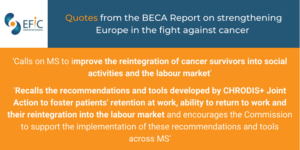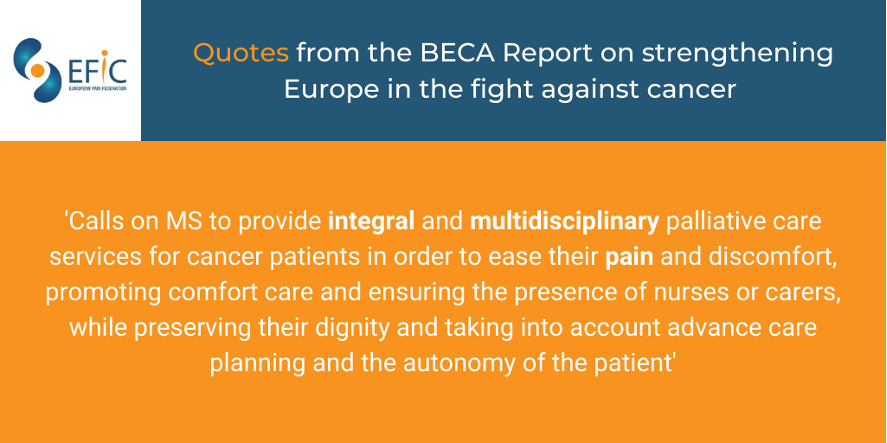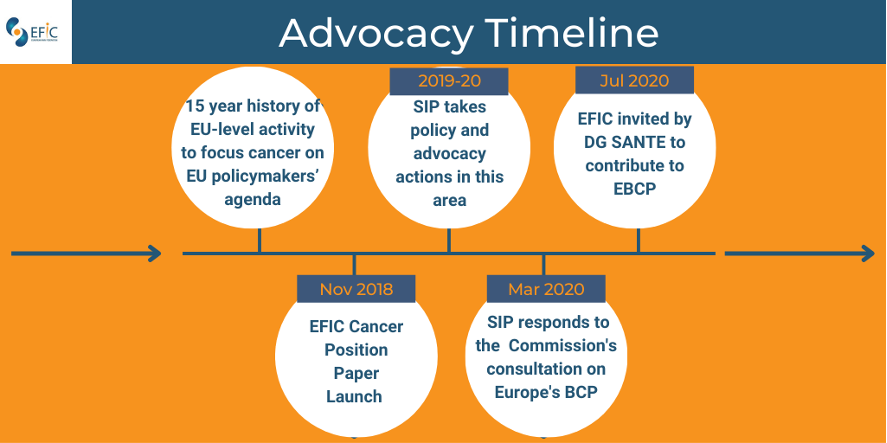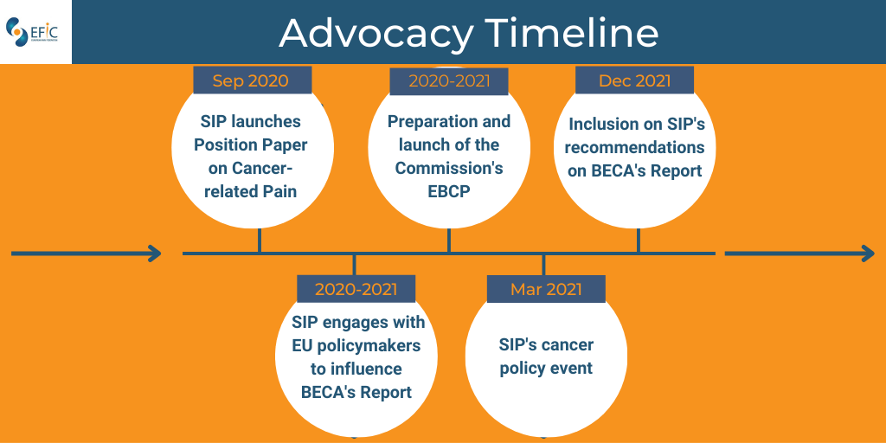European Pain Federation Cancer Pain Policy
Why We Do ‘Advocacy’ – Europe’s Beating Cancer Plan Case Study
What Is the Beating Cancer Plan?
Pain is a common symptom in patients who survive cancer and in those who live with progressive advanced disease. Evidence from meta‐analyses suggests that pain remains poorly controlled for a large proportion of patients; barriers to good management include poor assessment of pain, and inadequate support for patient self‐management, among others. Pain affects up to 40% of cancer survivors and affects at least 66% of patients with advanced progressive disease, many of whom experience poor pain control. Therefore, the need for a European action was imperative.
In 2017 EFIC put together a multidisciplinary Task Force of European experts to prepare standards for the appropriate management of cancer-related pain. This culminated in the 2018 EFIC Standards for the management of cancer‐related pain across Europe – A position paper from the EFIC Task Force on Cancer Pain.
In addition to the momentum from the scientific literature, the focus on cancer has also increased in the political arena, with European Commission President Ursula von der Leyen’s Political Guidelines for the Next European Commission 2019-2024 specifically mentioning the need for a European cancer plan. In the ensuing Mission Letter to Stella Kyriakides (Commissioner for Health and Food Safety), Kyriakides was tasked with developing a plan proposing actions to strengthen Europe’s approach at every key stage of cancer: prevention, diagnosis, treatment, life as a cancer survivor, and palliative care.
The European Commission’s work on cancer sits within the Directorate General for Health (DG SANTE), and on the 3rd February 2021, Europe’s Beating Cancer Plan (EBCP) was launched, which reflects a political commitment to mobilise the European Union’s collective power to drive change to the benefit of its citizens. The plan, with its policy objectives, supported by ten flagship initiatives and multiple supporting actions, will coordinate and complement Member States’ efforts to reduce the suffering caused by cancer, with the sole aim of tackling the entire disease pathway. Hence, Europe’s Beating Cancer Plan was released in February 2021.
Our Rationale
In September 2020 SIP launched its Position Paper on Cancer-related Pain, in which it called upon European Institutions and national governments to improve cancer-related pain policies. Specifically, the Paper called for establishing pain as a quality indicator, referencing standards for cancer-related pain in cancer policies (such as the EFIC Standards), making resources available for cancer care and treatment services, and encouraging the provision of education and training in pain assessment and management.
This coincided with the development and launch of the European Commission’s Beating Cancer Plan. SIP provided input to the Commission’s Roadmap and public consultation process, and organised a special multi-stakeholder event to discuss the plan’s implementation and next steps.
Europe’s Beating Cancer Plan has several Flagship initiatives and supporting actions that are of particular interest to SIP, such as:
- Flagship 1: Creation of the Knowledge Centre on Cancer.
- Flagship 5: Making an EU Network of National Comprehensive Cancer Centres and developing of an Inter-speciality Cancer Training Programme.
- Flagship 9: Setting up a Cancer Inequalities Registry.
- Creation of a Stakeholder Contact Group.
The momentum triggered the creation of the Special Committee on Beating Cancer of the European Parliament. The Committee was tasked with establishing a set of concrete recommendations for the member states and the EU institutions to strengthen our resilience against cancer. The Committee’s work culminated with the publishing of the ‘Report on strengthening Europe in the fight against cancer – towards a comprehensive and coordinated strategy’.
In this regard, SIP carried out external engagement on the topic and met with more than 20 key EU policymakers from the European Institutions and Member States to discuss recommendations for cancer pain policy. For example, SIP met with Dolors Montserrat (PPE, Spain), Margarita de la Pisa (ECR, Spain), Sara Cerdas (S&D, Portugal), Irena Joveva (Renew, Slovenia), and Marian-Jean Marinescu (PPE, Romania) amongst many others.
SIP had the opportunity to feed into this report and include concrete recommendations based on its recently published position paper on workplace integration and adaptation, which defends the adaptation of the workplace for people living with pain, such as cancer patients and cancer survivors, as well as their reintegration into society and workplaces.
SIP’s multi-stakeholder cancer pain policy event took place in early March 2021, and welcomed over 75 delegates from across Europe, and was hosted and supported by several members of the European Parliament’s Special Committee on Beating Cancer (BECA). The event also included speakers from the European Commission, Member States, and cancer pain experts, such as Alessandra Moretti (Italy, S&D), Sirpa Pietikäinen (Finland, EPP), Stefan Schreck (DG SANTE), and produced several recommendations based upon both SIP’s Cancer Position Paper and discussions during the breakout sessions of the event itself.
These recommendations linked both the activities of SIP and EFIC, but also ensured the PAE and patient perspective, and the need for national implementation, such as the fact that pain and in particular, cancer pain, should be adopted as a quality indicator in European health systems performance and assessment processes (for example, via Flagship 5 and the EU Network linking National Comprehensive Cancer Centres, and Flagship 9 and the Cancer Inequalities Registry). Additionally, recommendations on the importance of focusing specific attention on the education and training of healthcare professionals in the field of pain and patients access to high quality cancer pain management across Europe, throughout the cancer patient journey, were also drafted.
In line with SIP’s current priorities and area of focus, a recommendation was drafted stating that the ICD-11 classification of cancer-related pain, and exchange of best practices (such as the EFIC Standards), should be considered within the implementation of the Beating Cancer Plan.
What Our Asks Were
As mentioned, SIP met with more than 20 key policymakers from the European Institutions, some of which were members of the BECA Special Committee and, therefore, SIP had the opportunity of feeding into the ‘Report on strengthening Europe in the fight against cancer – towards a comprehensive and coordinated strategy’.
SIP highlighted the need for the Beating Cancer Plan to address effective cancer pain management (throughout the cancer pain patient journey, with a holistic, multi-modal, multi-disciplinary, and biopsychosocial approach to pain).
This could be contextualised within the fifth theme of the Plan, i.e., Ensuring Access to High Standards in Cancer Care, which aligns with SIP’s following calls to EU institutions and national governments:
- Establish and/or use pain as a quality indicator in the assessment of healthcare systems’ quality and thus contribute to assessing the societal impact of pain and build on existing initiatives and opportunities to fill the data gap on the societal impact of pain.
- Reference the inclusion of standards for the management of cancer-related pain across Europe to improve cancer pain management, promote quality of care and reduce variation and inequalities across Europe.
Other asks included, for example, acknowledging the need for employers to provide reasonable, flexible workplace adjustments which can help individuals with cancer / chronic pain to stay in work or reintegrate into the workforce (recommendation adapted from the 2018 SIP Joint Statement).
What Was The Result?
The BECA Draft ‘Report on strengthening Europe in the fight against cancer – towards a comprehensive and coordinated strategy’, included a number of SIP priorities, such as the need for equal and quality access to cancer care, and the need to treat pain within the cancer care pathway. As well as highlighting the importance of supporting cancer patients, survivors and caregivers, and improving their quality of life via pain relief, psychological services and adapted physical activity. Additionally, the Draft Report also included the recognition of quality standards; called for the promotion of improved, high-quality, accredited, and common education and training standards for health professionals; supported the call for the launch of an inter-speciality cancer training programme; called for the development of a multidisciplinary decision-making and multidisciplinary practice in cancer services; highlighted the need for exchange and implementation of best practices at EU level; called for the integration of cancer patients and survivors into the workplace and reintegration of cancer survivors into the labour market and advocated for the development of a digital health system to improve cancer services, especially after the COVID-19 pandemic.
As for the final voted Report, all the above points remained, and were developed further to include the importance of telemedicine and new technologies, such as AI, and their potential to improve cancer research, treatment process and care; the importance of timely and adequate treatment and care; the importance of the recommendations and tools developed by the CHRODIS+ Joint Action, to foster patients’ retention at work, return to work and reintegration into the labour market; the importance of fostering research, as well as improve care management and care pathways for patients, from primary care, up to highly multidisciplinary healthcare centres and implementing adequate referrals to specialised and multidisciplinary expert centres at both national and EU level.
As previously mentioned, one of the objectives of Europe’s Beating Cancer Plan is to build a stronger multidisciplinary cancer workforce. High-quality cancer care depends on a high-quality workforce. Patients deserve the best care possible and health professionals need support to ensure they can receive training and keep updating their skills throughout their professional lives. As such, an ‘inter-speciality cancer training programme’ was launched to help deliver a more skilled and mobile cancer workforce through cross-border training and information-sharing.
This action supports the implementation of Europe’s Beating cancer Plan objective to ensure a high-quality health workforce and implements the EU4Health Programme’s general objective of improving and fostering health in the Union, and SIP/EFIC had the pleasure of being part of the consortium that won the inter-speciality cancer training programme call.
Please find below some direct quotes from the BECA Report on strengthening Europe in the fight against cancer – towards a comprehensive and coordinated strategy. Several of our amendment suggestions were accepted by MEPs and eventually adopted in the final report:



Advocacy Timeline


What Next?
In terms of next steps, the Commission has published an Implementation Roadmap to complement the Beating Cancer Plan.
The next steps are critical for the implementation of the Beating Cancer Plan to ensure the Flagships actually work in practice / on the ground in Member States. Specifically, we need to ensure that:
- National policymakers and stakeholders are engaged.
- National and / or regional-level funding and associated action are available.
- We take the needs of pain professionals and patients into consideration for the Beating Cancer Plan’s implementation.
On a practical level, SIP/EFIC has engaged in a number of EU-level activities to help support the momentum for the implementation of the Beating Cancer Plan. For example:
- Becoming engaged in the call for an EU Inter-speciality Cancer Training Programme, as mentioned above.
- Outlining a special focus on capacity building and education for all (professionals, patients, policymakers, and other stakeholders within the health policy ecosystem).
- Participating as an active member within the European Cancer Organisation’s policy workstreams.
However, there are gaps that still need to be addressed. SIP and EFIC will continue to work on this very important topic in 2022 and beyond, by continuously disseminating and updating their position papers, tracking the implementation of the policy, and monitoring future calls within the Horizon Europe and EU4Health programmes.
Sources of Interest
- SIP contributed to the European Cancer Organisation’s publication entitled “Free from Cancer: Achieving Quality of Life for All Cancer Patients and Survivors”.
- A Handbook from the European Cancer Leagues to break the taboo surrounding cancer in the workplace.
- Chapter 7 of the EU CANCON Guide: Survivorship and rehabilitation: policy recommendations for quality improvement in cancer survivorship and rehabilitation in EU Member States.
- The European Cancer Patient’s Bill of Rights.